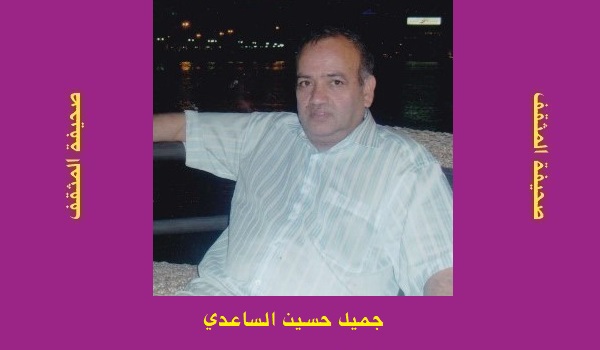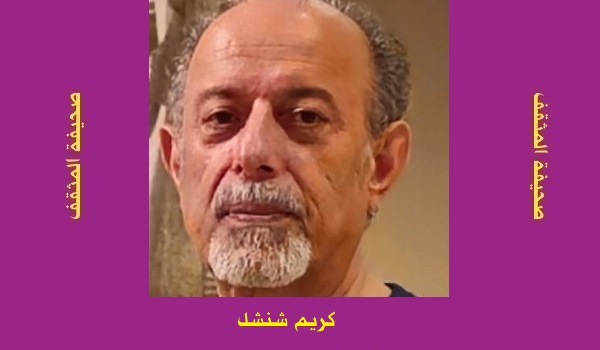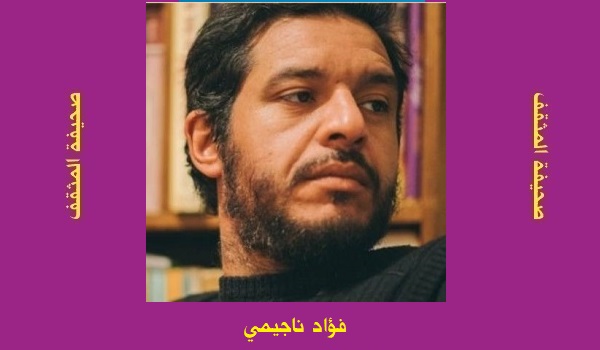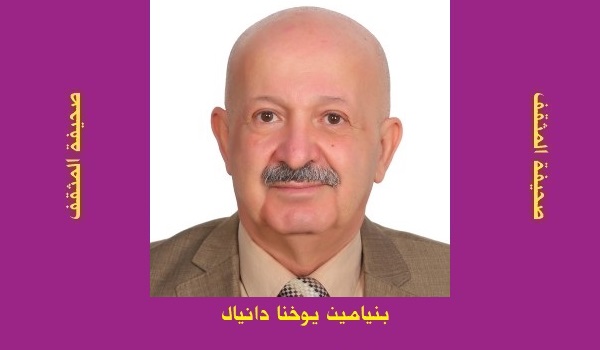ترجمات أدبية
Ali Al-Kasimi: The Ghost City

The Ghost City
by Ali Al-Kasimi
Translated by Hassane Darir (Professor of Translation and Terminology, Cadi Ayyad University, Marrakech) and revised by W Richard Oakes Jr. (PhD-University of Edinburgh, Independent Scholar)
***
I stare at the arranged letters; I devour them. I listen to the voices of the consecutive words; I articulate them. I trace the meanings of the flowing phrases; I comprehend them. Wonder overtakes me for what happened and how it happened. I cast a questioning glance through the dusty window, but I perceive nothing but yellow sand dunes, stretching endlessly, to the end of the horizon, where they merge with the cheek of the setting sun, making it pale. Simultaneously silent and articulate dunes emanating the essence of the desert with all its hidden secrets and its deep-rooted history, buried in the heart of time, lost in the depths of strangeness. I turn my face to my American wife, standing in front of me, and staring at me. I explain to her what I have realized. Astonishment shines in her eyes, and she says:
- Wow, that's amazing! Now I don't regret the trip.
She had tried to dissuade me from that journey, arguing:
- You throw yourself into danger when you roam the desert. For what? Just to find the city from which your grandfather emigrated to America. And what good is that to you? In practical terms, how useful is the past? We are rapidly approaching the threshold of the twenty-second century, and you are a product of your time. Look forward, look up at the high stars. Don't look back, don't stare down at the mud.
When her words and pleas hit the wall of my firm determination, she changed her mind, decided to accompany me on my journey, and began to help me prepare for it.
Being specially equipped for the desert, our electric car, which was pulling a supply cart attached to it, was moving on the sand like a frightened fugitive lizard. The hum of its engine was fading into the complete silence of the space around us. The sun was shedding its bright golden rays over the undulating desert in front of us. The thirsty sand guzzled them up, leaving nothing in the bottom of the cup, except a mirage that our eyes glimpsed, rising and falling like the water of a remote lake.
The information on the car's computer screen, next to the steering wheel, was pointing to the fact that we were coming closer to our destination, but we couldn't figure anything out. We haven't seen any ruins or remnants. We almost raised the banner of despair on the fatigue pole, when there appeared on the far horizon before us, sky-high sand-colored pillars that challenge the sky. We thought, at first glance, they were immense orderly ghosts, like a row of mythical creatures, coming from other planets. Then they soon appeared to us in the form of high-rise buildings, the more we approached them the taller they seemed.
Finally, we were embraced by the first street of the city. Large, luxurious streets, and big, lavish buildings. An existing city with all its buildings and facilities, unaffected by any earthquake or flood. But it is deserted and empty, there is no human, no animal, and no plant. Some of its doors and windows were swaying in the light wind causing them to squeak, thus sowing terror and obsession in our souls. On the roads, the glass of some of its shattered windows was scattered, mixed with the piles of sand that had gathered here and there. There were empty spaces between the buildings, which must have once been parks, or parking lots. We stayed for a long time, apprehensive of a human or an animal coming out of a door.
We penetrated the city centre heading to its western neighborhoods where abandoned luxury residences proliferated. We parked in the middle of the Main Street, landed on foot and walked on the sand-covered sidewalk, along the doors. Some of them were locked, others closed, and still others were wide open. All of them bear copper or wooden pieces with the name of the resident inscribed on them. Most of the names are feminine, such as (Hessa's Villa) and (Jewel's Villa 2). We slowly and sadly approach some houses to take a look. At every turn, there is a gasp and a surprise. Behind every door, there is a secret that does not reveal itself to history. And on every piece of luxury furniture, there goes a chill of sorrow.
Suddenly, I froze in place. I started staring at the piece that was attached to one of the doors, not believing my eyes. It had our family name. I was amazed at the fact that it differed from the names of other houses. I remembered what my father used to say to me when I was young, sometimes as a reproach:
- Always do things your own way. Don't do what all people do. That's how your grandfather was!
My wife's voice reached my ears, interrupting the reminders of my childhood:
- What's the matter with you? Why are you so dumbfounded?
- We've reached our destination. I can't believe it.
We entered the house, and we found all the furniture, even the curtains which were quivering in the breeze on the windows, as if my parents had left it that morning, were it not for the sandy cover that settled on the beds and the walls. My heart being filled with nostalgia, we moved from one room to another. Its palpitations increased so that it was burning with love. Then we climbed the stairs to the top floor. There I found my grandfather's library with its elegant shelves and its leather-bound books, in the middle of which was his desk on which he wrote most of his books, for which my father taught me Arabic. On the right side of the desk was his diary. I caught the embers of nostalgia with my heart, and opened the front page, with trembling fingertips, as a child opens his first book in school. I began to turn its pages, staring at the compact letters, and astonishment was shining on my face:
April 20, 2021
Our economy is as stagnant as a putrid swamp.
May 25, 2021
The oil we produce is the only commodity in the world whose price is constantly falling, thus violating all economic principles. For forty years, the price of a barrel has been in constant decline, falling from more than one hundred and twenty dollars to less than one dollar!
June 3, 2021
Alternative energy sources make our oil an undesirable commodity, something trivial and worthless, a dirty material that hands avoid. It is the coal of the twenty-first century. Even in our country, we can't take advantage of oil. All the machines, engines and cars that we import are not powered by oil at all.
June 30, 2021
Foreign workers and employees are leaving the country massively, not to spend the summer vacation with their families, but forever, because of the low wages they haven't been paid for months. Ten years ago, we sought to expel foreign workers who did not have a valid residence permit. Today, it is difficult for us to recruit the necessary workers and technicians. The money that was attracting them to the city ran out, so they left it. As for us, our roots are palm roots that hit far into the depths of the soil. We simply cannot travel with the wind like lichens.
July 25, 2081
Many people had to spend the night in the open in order to get some sleep. Today, the temperature has reached more than fifty degrees Celsius. The air conditioners of many buildings are out of order, because they haven’t been maintained. The cement boxes, called apartments, have become intolerable pieces of hell.
July 30, 2081
The young people who flocked to the city during its prosperous days, coming from nearby oases and distant villages, hoping for a better life, have begun to return home. The city could no longer offer them their dreams on a golden platter, so they abandoned it. As for us, we will not turn our backs on our city. We were here when our houses were built out of clay 50 years ago, we stayed here when they turned into residences of alabaster and cement, and we will be guarding in our positions, even after the alabaster has crumbled and the cement has been crushed. What grieves us is the drought that has afflicted our minds. None of us has come up with any acceptable alternatives.
August 20, 2081
What I feared has happened. The water that comes in from the desalination plant started decreasing, and then it was cut off three or four days a week. Now we resort to storing water in household tanks as a precaution.
September 15, 2081
Quite predictably, the taste of water has changed a lot. We drink sea salt in our coffee, and sugar can no longer soften its taste. But what's even worse is that we're out of water for longer and longer periods. There's not enough water to drink, let alone watering the city's withered shrubs. They are dying in place. It's the collapse of the new Marib (Ma'rib) Dam.
October 10, 2081
Hundreds of apartments have been left empty by their residents; dozens of buildings are completely closed, no one can rent apartments or buy them even at the lowest prices. The housing crisis that our press handled at length forty years ago has become a painful old joke.
November 30, 2081
There are no more foreign workers in the city that can leave. There are no remaining immigrants who have not returned to their oasis or village. Therefore, it was time for its native people to leave. I heard that our friend Abdullah and his family left last week, without trying to sell his house or furniture and without saying goodbye. But we are staying here. Our roots are inextricably linked with our soil.
December 31, 2081
Our neighbor Abdul Majeed and his family left the city by car just before dawn. He couldn't bear to see our eyes bidding farewell. The drought and lack of services to which he was accustomed became simply intolerable to him. Therefore, he chose to wrap himself in the blackness of the night outside the city. Nonetheless, we will stay, and our roots will stretch to the depths looking for a drop of water. Let the yellow leaves fall from the tops of the branches.
January 5, 2082
There have been frequent rumors about the possibility of a final disconnection of water from the seawater desalination plant. The wells that are still on the outskirts of the city do not satisfy out water requirements. The ghost of thirst looms over us at the beginning of the New Year.
February 1, 2082
A month ago, my pen's supply dried horribly, because the only remaining daily newspaper stopped publishing on the last day of the past year. I used to think that I was writing to satisfy a personal need, a desire to express my feelings, or to escape from my stifling reality to a more spacious imagined world. But I found out today that I was writing to communicate with others. When the bridges of communication with them were cut off, I refrained from writing, or rather it refrained from me. I only write down my intimate diary from time to time. Who do I write to? Tomorrow the wind will blow my papers, and the sand will obliterate my words.
February 18, 2082
My older brother confided to me today that he and his family members are determined to leave before the disaster strikes. He advised me to accompany him, saying that despite my persistence, the worm of anxiety sucks blood from my face, that fear dances on my lips and fingers, and that I must get out of the kingdom of fear and anxiety. I replied that the palm fronds may vibrate with the wind, but their roots are fixed in the depths. He said: "We'll see" and walked away.
February 20, 2082
All I have left is the diary. It's my only recourse. I turn to it to escape the silence. I take refuge in it from the solitude that suffocates me, the solitude imposed by drought, the solitude by which the desert strangles me, the solitude resulting from the fading of social life in this dying city. I broadcast in my diary things of no value, trivial things that never change the fate that awaits us. Nonetheless, they give me an opportunity to gossip with myself, and compensate me for a friend and comrade. They make me reflect on my feelings and behavior, so that I feel that I am still alive.
March 21, 2082
What a mockery of fate! Drought's monster has invaded our city, riding the steed of spring. The water from the seawater desalination plant was completely cut off. Thus, the dryness of our taps combines with the dryness of our souls.
April 22, 2082
The townspeople leave it in groups, like migratory birds. It is the season of migration in all directions.
May 5, 2082
The temperature continues to increase, and the water we draw from the remaining two wells is about to run out. And summer is just around the corner.
June 6, 2082
The few remaining families in the city gathered in our street, and chose the accommodations that suited them there. We called it Al-Somoud (Endurance/steadfastness) Street.
July 1st, 2082
Most of the steadfast people are now talking about heading abroad for the summer vacation. It's just an excuse. But I can't give up the cradle of memories.
July 8, 2082
Only our family remained on Al-Somoud Street. It is a solitary prison whose bars are wide open to the desert, and our determination is carried by a rocket launched to the frontiers of surrender.
July 11, 2082
What is the benefit for a palm to dig roots into the depths of the soil when its trunk is broken, and when it is falling to the ground? Dehydration overlooks us with his shabby face, from all sides.
July 14, 2082
Drought exhausts the last drop in the last well. Drought drinks the blood of my heart. Drought dries out the ink of my pen. I'm leaving.







